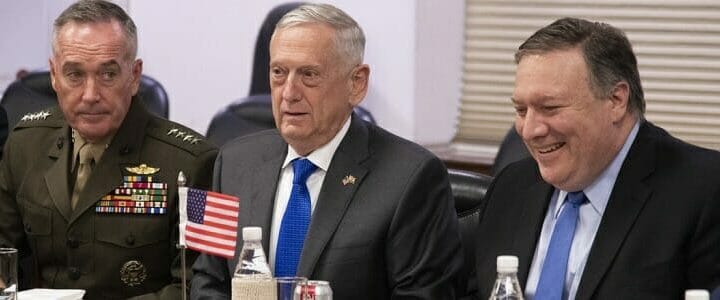It appears that the “adults in the room”—primarily Secretary of Defense James Mattis, Secretary of State Mike Pompeo, Chief of Staff John Kelly, National Security Adviser John Bolton, and U.N. Ambassador Nikki Haley—have prevailed over President Donald Trump’s isolationist instincts once again. In one of his darker moods, the president threatened to pull all U.S. forces out of Syria, even though the U.S.-led coalition had Islamic State fighters on the run and was trying to finish the job.
That no longer appears to be the case.
Syrian and Russian forces may be ready to use chemical weapons
Earlier this week, it became clear that Syrian and Russian forces were preparing an assault in Idlib, the last holdout of rebel forces opposed to the regime of Syria’s president, Bashar al-Assad. Trump warned Syria not to “recklessly attack” the rebel positions, which are largely in populated areas.
This shouldn’t really come as a surprise, since the rebels in Idlib are infested with al Qaeda-aligned extremists (among the more moderate rebels who have received U.S. assistance). The conditions in and around Idlib put the U.S. in the odd position of having to argue against attacking large numbers of al Qaeda terrorists massed in one area. This would be awkward were it not for the fact that analysts believe that, like the April assault on rebel positions in Douma, Assad’s regime is preparing to use chemical weapons in Idlib.
That’s a proposition that Trump can’t ignore. On Monday, he tweeted, “The Russians and Iranians would be making a grave humanitarian mistake to take part in this potential human tragedy. Hundreds of thousands of people could be killed. Don’t let that happen!” But as I’ve said over and over again, tweets aren’t policy. The policy came on Thursday evening.
Syria: “Let’s kill the lot of them”
Last month, the president appointed career diplomat James Jeffrey as special representative for Syria engagement. On Thursday, Jeffrey faced the press to announce the president’s change of heart. “The new policy is we’re no longer pulling out by the end of the year,” he told reporters. He also said the Trump administration is now insisting on the withdrawal of “all Iranian-commanded forces from the entirety of Syria.”
Jeffrey’s remarks went further than just warning against further chemical attacks. “Any offensive is to us as objectionable as a reckless escalation. he said. The president and his team are taking the right approach in Syria. The administration is sending a clear signal to the Syrians, Iranians, and Russians that the U.S. is prepared to respond forcefully to any assault on Idlib. But what would a U.S. response look like?
Earlier in the week, reports from those who had seen advance copies of veteran reporter Bob Woodward’s forthcoming book on the Trump White House said that Trump spoke to Mattis about his desire to hit Syria hard. “Let’s kill the f*****g lot of them,” the president allegedly told the secretary of defense. Mattis was able to move the president off that course of action, presenting a more traditional, measured response.
With His Back Against the Wall, What will Trump do?
With that information now public, one can understand that the Syrian government would think that it might just escape from its predicament. After all, the president is under siege from the American press as well as his usual detractors, and can ill-afford another instance where his subordinates openly defy his authority. That will most likely make any U.S. response to an Idlib offensive restrained.
Or not. With his back to the wall and his authority openly questioned, the president could force the issue to assert himself. This would be good for the Constitution, but bad for everyone else. But there seems to be little the U.S. can do to prevent the Idlib assault without engaging Russian forces directly, something the U.S. has been careful not to do in prior Syrian actions. The lone exception is the February incident where U.S. Special Forces engaged a column of Syrian tanks and Russian mercenaries moving on an oil refinery, killing more than 200 Russians.
This is a critical time for American foreign policy. Let’s hope the adults prevail.



